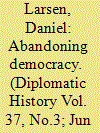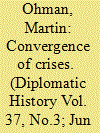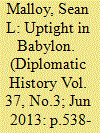|
|
|
Sort Order |
|
|
|
Items / Page
|
|
|
|
|
|
|
| Srl | Item |
| 1 |
ID:
123843


|
|
|
|
|
| Publication |
2013.
|
| Summary/Abstract |
Through an examination of American policy toward Germany during late 1918 to 1919, this article challenges widely held ideas about the attitudes of American President Woodrow Wilson toward democracy promotion. Scholars typically have seen in Wilson's foreign policy the antecedents of several subsequent U.S. presidents' policies of democracy promotion and democratic interventionism. This study contends that at least during the second half of Wilson's presidency, however, Wilson did not regard it as appropriate for the United States to intervene in the internal political affairs of other nations to promote democracy. While he hoped that postwar Germany would come to embrace democracy, he believed that the Germans would have to find democracy on their own. Despite the fact that those American diplomatic officials who were most familiar with the situation in Germany continually urged a more active U.S. policy to promote democracy there, Wilson remained deeply skeptical of the new German government and adhered firmly to the view that the United States should refrain from attempting to influence Germany's internal political affairs.
|
|
|
|
|
|
|
|
|
|
|
|
|
|
|
|
| 2 |
ID:
123842


|
|
|
|
|
| Summary/Abstract |
The American reaction to the outbreak of war in Europe in 1914 is always portrayed as one of shock and horror. Yet there has been no systematic study of the subject. This article examines American public at the time from the outbreak of war in August 1914 through the congressional elections of November 1914, through the medium of newspaper and journal writing. The picture that emerges is that the American population, far from being shocked and horrified, was excited and fascinated by the idea of a war in Europe. Moreover, the most widely shared sentiment was one of satisfaction at the economic opportunity presented by the war, as it was seen as being very much in American economic interest. This article also includes the present discussion among political scientists and strategic thinkers about the American public and its reaction to war in general, to provide different models by which to examine American behavior in 1914.
|
|
|
|
|
|
|
|
|
|
|
|
|
|
|
|
| 3 |
ID:
123841


|
|
|
|
|
| Publication |
2013.
|
| Summary/Abstract |
This article argues that the Missouri Crisis 1819-1821 was a consequence of growing concerns about geopolitical realignments in the post-Napoleonic world and the impending international recession. Scholars have typically explained the conflict over slavery's expansion as the last convulsion of the first-party system, a reflection of budding humanitarian considerations, or as a product of the growing contradictions between slavery and freedom in an era of an emerging liberal capitalist ethos and a democratization of American politics. The central element of the northern restrictionist position, however, was that slavery's expansion into the western territories would seriously impede the United States' ability to compete economically and mobilize militarily in times of war. In light of persistent tensions with foreign powers, the perceived risk of renewed great power warfare, international markets glutted, and every branch of the economy paralyzed, restrictionists saw the halting slavery's expansion as a necessary measure to save the federal republic.
|
|
|
|
|
|
|
|
|
|
|
|
|
|
|
|
| 4 |
ID:
123845


|
|
|
|
|
| Publication |
2013.
|
| Summary/Abstract |
As Bolivian inflation spiraled out of control in 1956, the United States-which had been aiding the revolutionary Nationalist Revolutionary Movement (MNR) government since 1953 in hopes of steering it down a conservative path-deployed banker George Jackson Eder to implement a monetarist stabilization plan that in many ways presaged the neoliberal reforms imposed across Latin America three decades later. The "Eder Plan" initiated in late 1956 stabilized the Bolivian currency, slashed government spending, and reoriented fiscal policy to prioritize payment on Bolivia's foreign debt and compensation to the deposed tin oligarchy. By restoring "free rein to private enterprise," Eder also sought to "purge" the government of all elements sympathetic to socialism, structuralism, and Keynesianism-what he called the "forces of darkness." The Eder Plan was a key turning point in the MNR's economic policy, and also signaled the beginning of the process of estrangement of the MNR from its working-class support base.
|
|
|
|
|
|
|
|
|
|
|
|
|
|
|
|
| 5 |
ID:
123847


|
|
|
|
|
| Publication |
2013.
|
| Summary/Abstract |
This article examines the tumultuous relationship between the World Bank and the U.S. government during the seventies. Drawing on previously untapped documents from the bank archives, it details the rise of U.S. opposition to the bank in the seventies and describes the resistance by the bank's president, former U.S. secretary of defense Robert McNamara, to American efforts to influence the organization during the time. A study of the bank's relationship with Chile in the early seventies demonstrates how the organization's behavior was guided as much by internal factors-in this case a desire to maintain its creditworthiness-as it was the result of pressure from the U.S. government. Nevertheless, the article concludes that U.S. support remained critical to the bank and, as such, the organization's autonomy was significantly bounded.
|
|
|
|
|
|
|
|
|
|
|
|
|
|
|
|
| 6 |
ID:
123846


|
|
|
|
|
| Publication |
2013.
|
| Summary/Abstract |
Eldridge Cleaver (1935-1998) was a key figure in the U.S. black power movement in the late sixties and early seventies whose globe-trotting freelance diplomacy on behalf of the Black Panther Party (BPP) led him from Soledad prison to the streets of Oakland, California and from there to Havana, Algiers, Pyongyang, Beijing, Hanoi, Brazzaville, and Paris. Cleaver's party-building efforts with the BPP illustrated the powerful appeal of an anticolonial analysis that looked beyond the East-West dynamics of the Cold War to position people of color as part of a global North-South struggle over decolonization. Cleaver's journey also illustrated the continuing and ultimately tragic relevance of the Cold War to the evolution of the African American freedom struggle. In establishing the International Section of the BPP, Cleaver found himself dependent on the whims of his new allies and highly sensitive to changes in the Cold War environment.
|
|
|
|
|
|
|
|
|
|
|
|
|
|
|
|
|
|
|
|
|